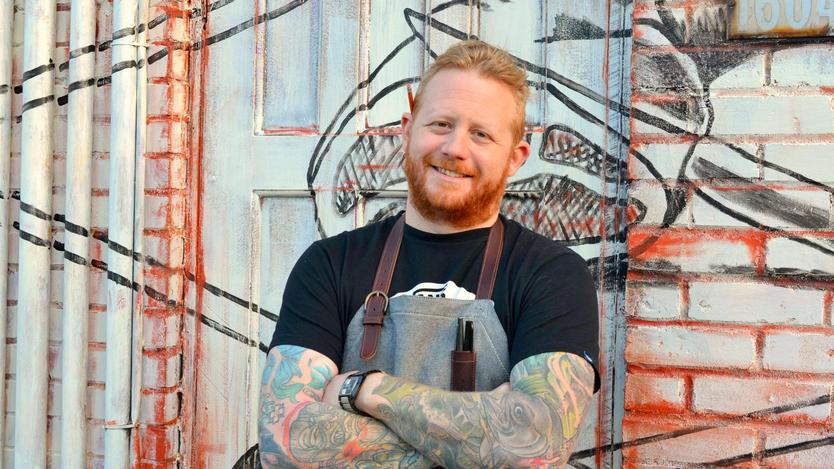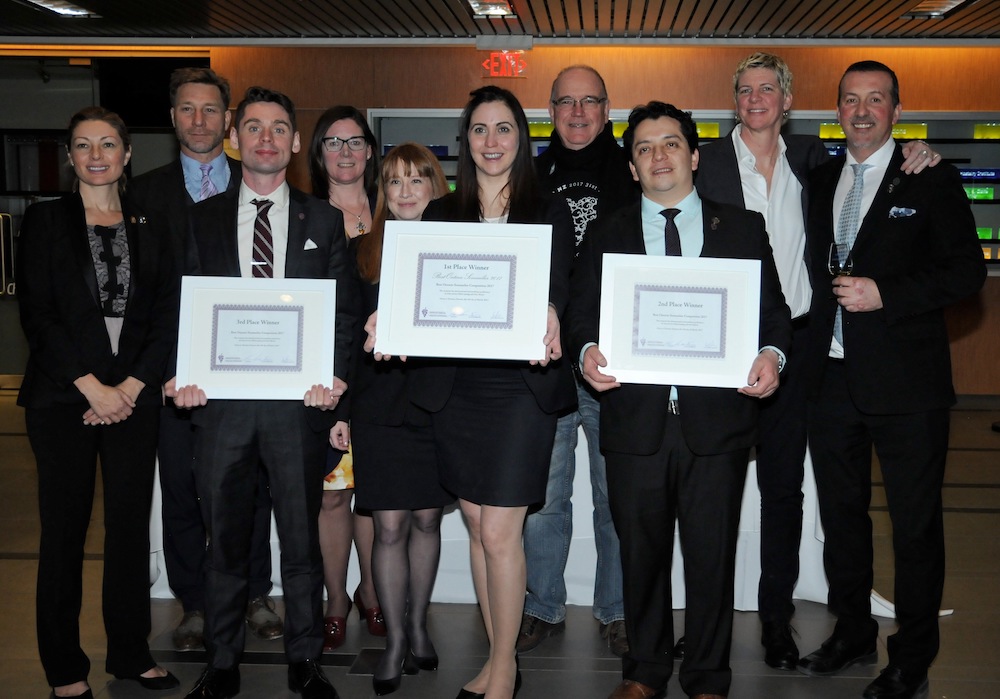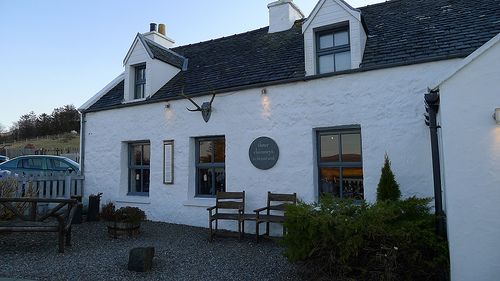This past weekend, Stratford hosted its annual Savour Stratford Perth County Culinary Festival, moving the festival from September to July in the hopes of attracting more tourists.
Invited chef, Derek Dammann, of Montreal’s Maison Publique, spoke to us at the GE Café Series where he and fellow chef, Dale MacKay, prepared a five-course meal for 40 guests. The man who helped develop Jamie Oliver’s Fifteen spoke about Stratford, food pet peeves, and what Maison Publique co-owner, Jamie Oliver, is really like.
Good Food Revolution: Did you always want to be a chef? Did you want to be a pirate, perhaps? Or an astronaut?
Derek Dammann: A Viking! Laughs
GFR: A Viking, yeah!
DD: It was kind of a coin flip. I really wanted to go into cooking, or work for the Department of Fisheries and Oceans.
GFR: What did you want to do for them?
DD: Maybe a game warden.
GFR: What were some of your culinary influences?
DD: My mom’s mom, my Nonna, was a very good cook, so that really inspired me cause I always spent a lot of time in the kitchen with her, seeing what she was doing.
GFR: Stratford is a really interesting, special place for us at Good Food Revolution. What makes it a special festival for you?
DD: It’s actually an honour to be invited. I’ve never been before. I’ve known some people that have done it in the past and always had very nice things to say.
GFR: Other than the five-course meal you and Dale MacKay prepared today for the GE Café Series, what else will you be doing at the festival?
DD: I’m doing two presentations: one today and one tomorrow. I’m doing the courses I did today. I’m doing the salmon today… and the pork tomorrow. It’s a bit of a lengthy process to talk about. I think it’s kind of interesting how it comes about. Where the fish is from is very important. The fishermen that we get it from, Frank and Steve from Organic Ocean out in Vancouver, they’re doing something very special.
GFR: Which specific ingredients from Perth County are you using?
DD: All the basil. All the tomatoes. The tomato water. Both basils, the flowers and the basil seeds.
GFR: Are there any new products or ingredients you’re excited to get at the festival?
DD: This going to sound bad… I don’t get super excited to see ingredients, I get excited for people to show up. So just to go and see “Oh, that’s a bowl of tomatoes. That’s really pretty” but when you talk to the actual person who grew them, they have a story to tell. I want to meet the person. When I deal with the restaurant, I don’t deal with any middle-man, I deal directly with the farmer, ‘cause I find farming families very interesting and I find they work very hard and I find they often don’t get the recognition or credit they deserve.
GFR: Do you have any pet peeves in terms of ingredients, things we’ll never see on your menu?
DD: There’s things that I don’t use. It’s not that I don’t like them or I don’t like the taste or whatever, I just don’t care. Laughs Everyone can agree here. (addressing Dale MacKay and sous-chefs at GE Café Series) Everyone, the question is “What’s your biggest food pet peeve?” Should we just go for Fiddlehead? The group smiles and nods in agreement. One suggests salsify. Salsify I don’t care at all about. I don’t not like it, I just don’t care at all. Not one bit. Fiddleheads are just stupid.
GFR: What would you say would be the major differences between the UK and Canada on a culinary level?
DD: I think the one thing that’s very similar is that they both get a huge stereotype about their cuisine. What’s the first thing that people talk about when they talk about British cuisine? Oh, fish and chips, bullshit and pies and all that and it sucks. It couldn’t be farther from the truth. London is the best city I’ve ever been to in the world and they have the most amazing culinary scene. It’s unbelievable. And the food history goes back to medieval times. Those times had a really huge impact. They taught a lot of the world how to cook, you know? And Canada gets the same thing.
What do people think about in Canada? You can name it right now: doughnuts, back bacon, poutine. In a way, just as London’s very lucky, we’ve very lucky. They have a lot of culinary history, but they’re also a port city, like us, we’re a port country. We have a lot of cultures to draw from in Canada. You can put little Indian influences or Portuguese in your dish and you know what, it’s still considered Canadian food in my opinion. Canada is just as regional as any of the European countries.
GFR: Is Jamie Oliver as nice in real life as he is on TV?
DD: No, he’s a total jerk. Laughs. Yeah he really is one of the nicest guys. Very, very generous and giving, and just funny, fun to be around.
GFR: The partnership between the two of you seems really organic in terms of how you both place a social value on eating well. I was reading about how the food at Maison Publique comes out as it’s ready as opposed to and all at the same time and how you’ve said that affects people’s body language insofar as it changes: as opposed to being really protective of their plate they become very open. What can you tell me about that?
DD: It’s okay to take your food and everything seriously but it’s also a fun night out too, right? Some people think if they have their wine and it’s all very serious, but then you have your plate (Derek pretends to cover a plate) like someone’s cheating off of a test, you know? So I started throwing things to share in the middle. At this point, some people drink more, they open up, their body language changes. It’s nice to see. It’s a night out. Just enjoy yourself. The other part was that I just want to eliminate all the problems that comes with service before and just take them out. With the food coming when it’s ready, number one, it’s a bit more relaxed on the kitchen. I think it’s a better way to eat. It’s a kinda tough sell at first, but people share, they have a good time, neighbours share at the bar.
But the other thing too is that they get something between 7 and 10 minutes after they order, so it eliminates that whole “I’ve been waiting for 15 minutes” bullshit. It’s not for everybody, but 95 to 97 percent of the people that come to the restaurant are happy with doing that and that’s why people come now and they’re like “Just choose 5 things for us, we’re just going to share”, 2 years in. 6 months into the restaurant that wasn’t the case.
GFR: How would you describe your cuisine?
DD: That’s such a tough question to answer. Just like, we’ve got a stove and tables with 4 legs and a top to hold food and we’ve got people in the kitchen that are qualified and know how to season things. You know? Laughs.
GFR: What more could you ask for?
DD: What more could you ask for? Laughs. You know? Like, I don’t know. We use fresh ingredients and all our butchering is done by us. We don’t buy anything, we buy things and then we transform it there.
Maison Publique is located at 4720 Rue Marquette, Montréal, 514- 507-0555
Derek Dammann is currently working on a cookbook due out in Spring 2015
 Erica Ruth Kelly is a Montreal-born, now Toronto-based writer. A staff writer at She Does the City, her work has been featured in the Globe and Mail, the Montreal Gazette and Maisonneuve, among others. Follow her @ericaruthkelly
Erica Ruth Kelly is a Montreal-born, now Toronto-based writer. A staff writer at She Does the City, her work has been featured in the Globe and Mail, the Montreal Gazette and Maisonneuve, among others. Follow her @ericaruthkelly







